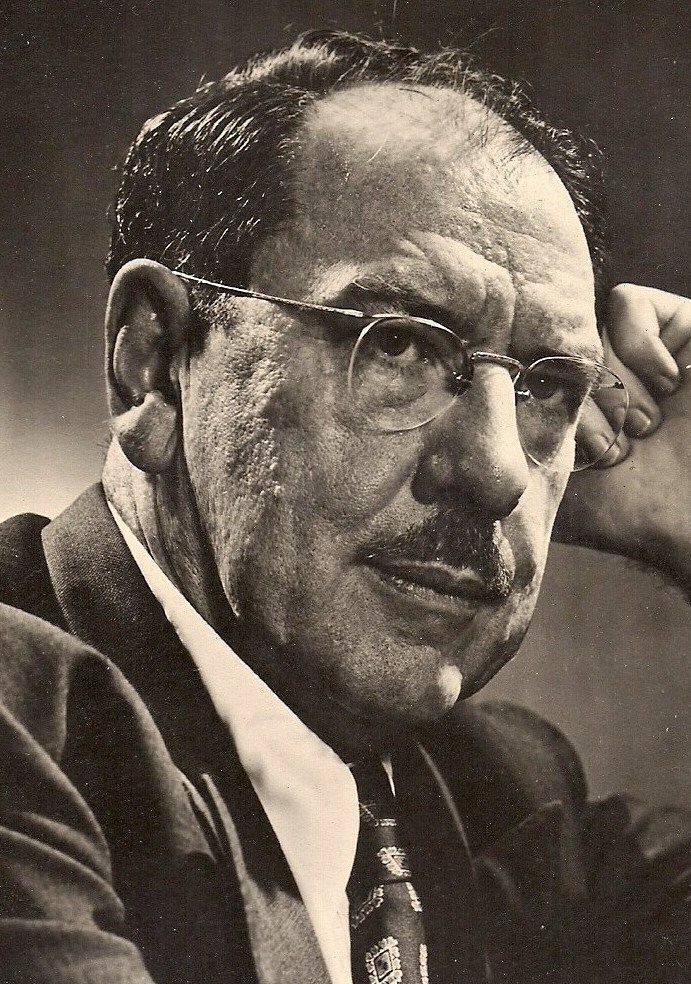Maxwell Anderson (Maxwell Anderson)

American Journalist, Author, Playwright, and Pulitzer Prize Winner. He became one of the first modern playwrights to use blank verse extensively in his literary works. Born in Atlantic, Pennsylvania, he was the son of a Baptist minister, whose family frequently relocated throughout Pennsylvania, Ohio, and North Dakota to follow the father’s ministerial posts. Sickly as a child, he missed a great deal of school, using his sick time to immerse himself in reading books. In 1907 the family moved to Jamestown, North Dakota where he graduated from Jamestown High School in 1908. He attended the University of North Dakota at Grand Forks and received his Bachelor of Arts Degree in English Literature in 1911. Shortly afterward he became a high school principal and English teacher in Minnewaukan, North Dakota but was fired in 1913 for making pacifist statements to his students. He then enrolled at Stanford University, Stanford, California where he received his Master of Arts Degree in English Literature in 1914. After teaching high school English in San Francisco, California for three years, he became chairman of the English department at Whittier College in Whittier, California in 1917 but was fired after a year for his public statements in support of a jailed student who was seeking status as a conscientious objector to keep from serving in the US Army during World War I. He moved to Palo Alto, California to write for the San Francisco Evening Bulletin but was terminated from that job for writing an editorial stating it would be impossible for Germany to pay off its war debt. Moving on to San Francisco to work for the San Francisco Chronicle, he was terminated after contracting the Spanish Influenza and missing work. He then moved to New York City, New York in 1918 where he was hired to write political articles for The New Republic, but was fired for winning an argument with its Editor-in-Chief, Progressive Movement leader Herbert David Croly. He found work at the New York Globe and the New York World, and in 1921 he founded The Measure: A Journal of Poetry, a magazine devoted to verse. In 1923 he wrote his first play “White Desert,” which ran only twelve performances despite received a good review by the New York World’s book reviewer, Laurence Stallings, who would collaborate with him on his next play, “What Price Glory?” in 1924, his first Broadway hit. His success as a playwright enabled him to leave his job at the World and he began devoting his full time to writing drama. In 1933 he was awarded a Pulitzer Prize for Drama with “Both Your Houses” and received the New York Drama Critics Circle Award for “Winterset” (1935) and “High Tor” (1937). He wrote a series of historical plays that were set during the reign of the Tudor dynasty in England, including “Elizabeth the Queen” (1930), “Mary of Scotland” (1933), “The Private Lives of Elizabeth and Essex” (1939) and “Anne of the Thousand Days” (1948), the popular story of King Henry VIII’s marriage to Anne Boleyn, which became an acclaimed movie in 1969. He also wrote the book and lyrics for two successful musicals in collaboration with composer Kurt Weill, “Knickerbocker Holiday” (1938), from which his tune “September Song” became very popular and “Lost in the Stars” (1949) from which came his title song as well as “Cry, The Beloved Country.” In 1946 he received an honorary doctor of literature degree from Columbia University, New York City, as well as an honorary doctor of humanities degree from the University of North Dakota in 1958. Additionally, in 1954 he received the Gold Medal in Drama from the National Institute of Arts and Letters. He died at the age of 70 in Stamford, Connecticut, two days after suffering a stroke. He was cremated, with half of his ashes scattered at sea near his home and the other half buried at Anderson Cemetery, near his birthplace. During his lifetime, he wrote more than thirty plays, many of which were adapted for the screen and television. (bio by: William Bjornstad) Family links: Parents: William Lincoln Anderson (1863 – 1936) Perrimela Stephenson Anderson (1867 – 1934) Spouses: Margaret Ethel Haskett Anderson (1887 – 1931)* Gertrude Higger Anderson (1904 – 1953)* Gilda Romano Anderson (1913 – 2002)* *Calculated relationship
Born
- December, 15, 1888
- USA
Died
- February, 02, 1959
- USA
Cemetery
- Anderson Family Cemetery
- Pennsylvania
- USA

